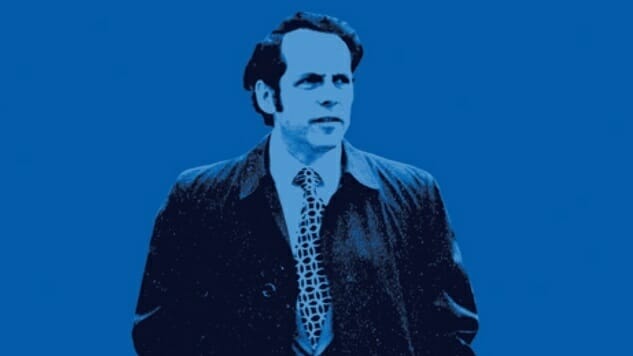Atlanta’s First Jewish Mayor Meets Eleanor Roosevelt in an Exclusive Excerpt from Play It Again, Sam

Before he was the first Jewish mayor of Atlanta, Georgia, Sam Massell was a self-described “dead-end kid” searching for his identity. But the same youth who “struggled between pride and prejudice for being Jewish” succeeded as an adult in guiding Atlanta through a period of change, as the city transitioned from an “all-white power structure to a black city government.”
In Play It Again, Sam, Pulitzer Prize-nominated author (and former Paste Books Editor) Charles McNair chronicles Massell’s extraordinary life over nine decades. The book offers an intimate look at Massell’s trials and triumphs throughout four careers, including his time as a liberal Democrat in Georgia’s largely conservative Republican government.
We’re excited to share an exclusive excerpt from the book ahead of its release on September 1st from Mercer University Press. You can read a passage from Chapter 5 below, which describes Massell’s years before becoming mayor—and details a memorable encounter with a former First Lady.

 On his first day in office as Atlanta Mayor, Ivan Allen Jr. ordered all “White” and “Colored” signs removed from City Hall. He desegregated the building’s cafeteria at the same time.
On his first day in office as Atlanta Mayor, Ivan Allen Jr. ordered all “White” and “Colored” signs removed from City Hall. He desegregated the building’s cafeteria at the same time.
Sam [Massell], the new Aldermanic Chairman, stood 100 percent behind Allen’s actions.
In Atlanta city government, the mayor and the president of the Board of Aldermen shared no political party, ticket, or affiliation (unlike the United States president and vice president). Harmony at the top meant Atlanta ran better, of course, but nothing required the mayor and vice mayor to support one another.
Sam and Mayor Allen differed in many way. Sam was a Jew, Allen a Protestant. Sam busied himself with many local nonprofit organizations; Allen belonged to Atlanta’s good-old-boy network and could walk into the most exclusive clubs in the city. Sam was an unabashed liberal; Allen had on record a prior segregationist campaign for governor.
Despite these differences, both took an oath of service to the city of Atlanta when sworn into office. A team player, Sam played trusty sidekick to Mayor Allen…to a point.
He fully supported Mayor Allen’s designation giving authority to Atlanta’s black policemen to arrest whites—a brave move, politically. Sam also backed Allen’s decision to hire the city’s first black firefighters.
Sam and Mayor Allen both worked openly with Dr. Martin Luther King Jr. and the Southern Christian Leadership Conference, and the two men helped host a hugely successful banquet—black and whites at tables together—to honor King after he received the Nobel Peace Prize in 1964.
Sam personally liked Allen, though it was generally known that the affection only ran one way.
Joe Hamilton, the retired founder and Chairman/CEO of Hamilton Dorsey Alston Company, which handled insurance work for Allen, minces no words: “Ivan didn’t like Sam worth a damn.”
“I believe Ivan Allen was a good man,” Sam says. “I believe he changed a great deal in his views on race and on people as he served in office. I believe he came around.”
Whatever else, Allen was the mayor, Sam vice mayor.
If Sam had to play second fiddle, he resolved to play it like a virtuoso.
On frequent occasions when Allen traveled, Sam stepped in as a sort of mayor pro tempore. He hosted and greeted and spread bonhomie, Southern style, among Atlanta’s special guests, VIPs, and visitors.
Eleanor Roosevelt once came to the city. That visit marks an especially fond memory for Sam, who chaperoned the former first lady as official representative of the city of Atlanta. The Roosevelt name meant a lot to Sam. President Franklin Delano Roosevelt had been the living embodiment of many of Sam’s liberal ideals—and Mrs. Roosevelt was cut from even more liberal cloth.
On her last evening in town, Mrs. Roosevelt joined Sam and Ralph McGill, along with Helen Bullard, Margaret MacDougall, and others, at the Atlanta home of Henry Toombs. A noted architect, Toombs designed Roosevelt’s famous Georgia fortress of solitude, the Little White House, in Warm Springs. (Roosevelt died unexpectedly at Warm Springs in 1945.)
Sam basked that evening in lofty conversation, poetry, and storytelling. At the witching hour, the party winding down, he stepped forward to play the gentleman host.
“Mrs. Roosevelt, where is your security?”
The lady gave him a look. “I don’t have any security.”
Sam was astonished. Partly, he admired Mrs. Roosevelt’s complete lack of pretention, but he felt a little less impressed by her stubbornness, or maybe naivety. Any woman, alone, in the 1960s, driving herself completely across an unknown city late at night…
Sam shuddered to imagine the headlines.
He made an offer, a perfect host. “You’ll be going to the Atlanta airport with an Atlanta police escort.”
“Oh, no, I’m not” Mrs. Roosevelt’s cheeks flushed red. Sam saw she was a spirited lady.
And a spirited dialogue followed. Sam Massell and Eleanor Roosevelt gently argued.
Ever a negotiator, Sam finally arranged, with Mrs. Roosevelt’s grudging agreement, to have a police cruiser discreetely follow her vehicle—at a distance—from north Atlanta to the airport on the south side of town.
“I certainly enjoyed Mrs. Roosevelt’s company when we were together,” Sam says, “but I was greatly relieved when I was told she had finally boarded her plane.”







































